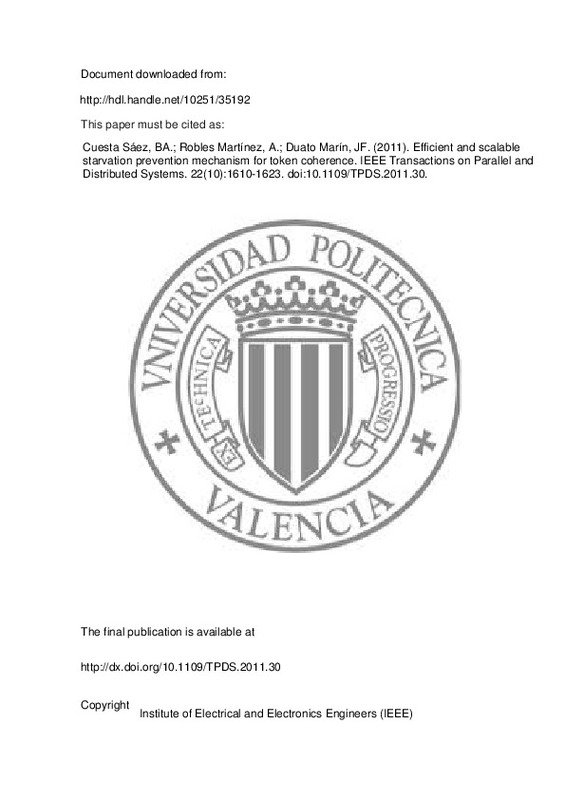JavaScript is disabled for your browser. Some features of this site may not work without it.
Buscar en RiuNet
Listar
Mi cuenta
Estadísticas
Ayuda RiuNet
Admin. UPV
Efficient and scalable starvation prevention mechanism for token coherence
Mostrar el registro sencillo del ítem
Ficheros en el ítem
| dc.contributor.author | Cuesta Sáez, Blas Antonio
|
es_ES |
| dc.contributor.author | Robles Martínez, Antonio
|
es_ES |
| dc.contributor.author | Duato Marín, José Francisco
|
es_ES |
| dc.date.accessioned | 2014-01-28T07:58:26Z | |
| dc.date.issued | 2011-10 | |
| dc.identifier.issn | 1045-9219 | |
| dc.identifier.uri | http://hdl.handle.net/10251/35192 | |
| dc.description.abstract | [EN] Token Coherence is a cache coherence protocol that simultaneously captures the best attributes of the traditional approximations to coherence: direct communication between processors (like snooping-based protocols) and no reliance on bus-like interconnects (like directory-based protocols). This is possible thanks to a class of unordered requests that usually succeed in resolving the cache misses. The problem of the unordered requests is that they can cause protocol races, which prevent some misses from being resolved. To eliminate races and ensure the completion of the unresolved misses, Token Coherence uses a starvation prevention mechanism named persistent requests. This mechanism is extremely inefficient and, besides, it endangers the scalability of Token Coherence since it requires storage structures (at each node) whose size grows proportionally to the system size. While multiprocessors continue including an increasingly number of nodes, both the performance and scalability of cache coherence protocols will continue to be key aspects. In this work, we propose an alternative starvation prevention mechanism, named priority requests, that outperforms the persistent request one. This mechanism is able to reduce the application runtime more than 20 percent (on average) in a 64-processor system. Furthermore, thanks to the flexibility shown by priority requests, it is possible to drastically minimize its storage requirements, thereby improving the whole scalability of Token Coherence. Although this is achieved at the expense of a slight performance degradation, priority requests still outperform persistent requests significantly. | es_ES |
| dc.description.sponsorship | This work was partially supported by the Spanish MEC and MICINN, as well as European Commission FEDER funds, under Grants CSD2006-00046 and TIN2009-14475-C04-01. Antonio Robles is taking a sabbatical granted by the Universidad Politecnica de Valencia for updating his teaching and research activities. | |
| dc.format.extent | 14 | es_ES |
| dc.language | Inglés | es_ES |
| dc.publisher | Institute of Electrical and Electronics Engineers (IEEE) | es_ES |
| dc.relation.ispartof | IEEE Transactions on Parallel and Distributed Systems | es_ES |
| dc.rights | Reserva de todos los derechos | es_ES |
| dc.subject | Cache coherence | es_ES |
| dc.subject | Starvation prevention | es_ES |
| dc.subject | Token coherence | es_ES |
| dc.subject | Scalability | es_ES |
| dc.subject.classification | ARQUITECTURA Y TECNOLOGIA DE COMPUTADORES | es_ES |
| dc.title | Efficient and scalable starvation prevention mechanism for token coherence | es_ES |
| dc.type | Artículo | es_ES |
| dc.embargo.lift | 10000-01-01 | |
| dc.embargo.terms | forever | es_ES |
| dc.identifier.doi | 10.1109/TPDS.2011.80 | |
| dc.relation.projectID | info:eu-repo/grantAgreement/MEC//CSD2006-00046/ES/Arquitecturas fiables y de altas prestaciones para centros de proceso de datos y servidores de Internet/ | es_ES |
| dc.relation.projectID | info:eu-repo/grantAgreement/MICINN//TIN2009-14475-C04-01/ES/Arquitecturas De Servidores, Aplicaciones Y Servicios/ | es_ES |
| dc.rights.accessRights | Abierto | es_ES |
| dc.contributor.affiliation | Universitat Politècnica de València. Departamento de Informática de Sistemas y Computadores - Departament d'Informàtica de Sistemes i Computadors | es_ES |
| dc.description.bibliographicCitation | Cuesta Sáez, BA.; Robles Martínez, A.; Duato Marín, JF. (2011). Efficient and scalable starvation prevention mechanism for token coherence. IEEE Transactions on Parallel and Distributed Systems. 22(10):1610-1623. https://doi.org/10.1109/TPDS.2011.80 | es_ES |
| dc.description.accrualMethod | S | es_ES |
| dc.relation.publisherversion | http://dx.doi.org/10.1109/TPDS.2011.80 | es_ES |
| dc.description.upvformatpinicio | 1610 | es_ES |
| dc.description.upvformatpfin | 1623 | es_ES |
| dc.type.version | info:eu-repo/semantics/publishedVersion | es_ES |
| dc.description.volume | 22 | es_ES |
| dc.description.issue | 10 | es_ES |
| dc.relation.senia | 211491 | |
| dc.contributor.funder | Ministerio de Educación y Ciencia | |
| dc.contributor.funder | Ministerio de Ciencia e Innovación |







![[Cerrado]](/themes/UPV/images/candado.png)

